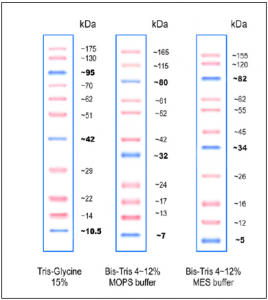
The molecular weight marker market pertains to the supply and demand of reagents used in molecular biology experiments to estimate the size of unknown DNA, RNA, or protein samples, based on a molecular weight standard ladder. The market includes both pre-stained and unstained molecular weight markers, which are available in different forms, such as agarose gels, polyacrylamide gels, and protein electrophoresis.
Get Sample PDF Report with Graphs and Figures Here
A molecular weight marker for DNA is a reagent used in molecular biology experiments to estimate the size of unknown DNA samples, based on a molecular weight standard ladder. The markers are composed of DNA fragments of known molecular weight that are run alongside the DNA sample on an agarose gel or another type of gel electrophoresis system.
By comparing the mobility of the unknown DNA to the mobility of the known molecular weight markers, researchers can estimate the molecular weight of the unknown DNA fragment. DNA molecular weight markers are usually provided as a mixture of DNA fragments with different molecular weights, ranging from around 100 base pairs (bp) to over 20,000 bp, depending on the product.
DNA molecular weight markers are important tools in molecular biology research, as they allow researchers to determine the size of the DNA fragment of interest, and to confirm that the DNA has been amplified or cut correctly.
In a Western blot, a molecular weight marker (also called a protein ladder or protein marker) is a reagent used to estimate the size of the protein bands of interest based on a molecular weight standard ladder. The marker is composed of proteins of known molecular weight that are run alongside the protein sample on a polyacrylamide gel electrophoresis (PAGE) system.
After the proteins have been separated by size in the gel, they are transferred onto a nitrocellulose or PVDF membrane, which is then probed with a primary antibody that recognizes the target protein. The molecular weight marker is used as a reference to estimate the size of the protein of interest based on the migration distance of the marker bands.
Molecular weight markers are important in Western blotting, as they allow researchers to determine the size of the protein of interest and to confirm that the protein has been transferred to the membrane correctly. Protein molecular weight markers are usually provided as a mixture of proteins with different molecular weights, ranging from around 10 kilodaltons (kDa) to over 250 kDa, depending on the product.
A high molecular weight DNA marker is a type of molecular weight marker used in gel electrophoresis experiments to estimate the size of unknown DNA samples. As the name suggests, high molecular weight DNA markers are composed of large DNA fragments with known molecular weights that are run alongside the sample DNA on an agarose gel or another type of gel electrophoresis system.
High molecular weight DNA markers typically consist of DNA fragments that range in size from several thousand base pairs to hundreds of thousands of base pairs. These markers are used to estimate the size of large DNA fragments, such as those found in genomic DNA.
High molecular weight DNA markers are useful in a variety of molecular biology applications, including genome mapping, gene cloning, and DNA sequencing. They allow researchers to determine the size of the DNA fragment of interest and to confirm that the DNA has been cut or amplified correctly.

